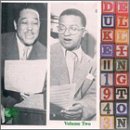| All Artists: Duke Ellington Title: Duke Ellington and His Orchestra, Vol. 2: 1943 Members Wishing: 2 Total Copies: 0 Label: Circle Release Date: 12/1/1995 Album Type: Import Genres: Jazz, Pop Style: Swing Jazz Number of Discs: 1 SwapaCD Credits: 1 UPC: 762247410225 |
Search - Duke Ellington :: Duke Ellington and His Orchestra, Vol. 2: 1943
 | Duke Ellington Duke Ellington and His Orchestra, Vol. 2: 1943 Genres: Jazz, Pop
|
Larger Image |
CD Details |
CD ReviewsA delight for Ellington completists bukhtan | Chicago, Illinois, USA | 11/01/2007 (5 out of 5 stars) "This is the second volume of Circle Record's release of Duke Ellington's World Transcriptions, recorded on November 9th 1943, after Decca Studios signed an agreement with the American Federation of Musicians, beginning the end of the recording ban during which so much good jazz music was lost to posterity.
"Transcription" was recording jargon for recordings made in studio for sale only to radio stations and other non-public purchasers; this strategem was one of the responses to the sense musicians (and their agents) had that they were not well recompensed for radio play of their 78's. These special recordings were quite different in type from those available to the music-buying public; the discs supplied to the stations might play outward as well as inward, and they afforded the musicians longer playing times than the 78 did. Of more immediate interest to modern listeners is the sound quality of these recordings; they are the best I have heard up to this time, in part, I imagine, because they are in fact transferred from masters rather than surviving 78's. And, the point of it, the music itself is excellent. It's true that several stars of 1940 are missing: Cootie Williams is gone, Ben Webster as well, the great Jimmy Blanton is dead, and Barney Bigard has departed. But by the time of these recordings, Cootie has to some degree been replaced by Ray Nance, now a prominent trumpeter, and, in my view, as good a singer as Duke ever had. Junior Raglin is, really, quite as good a band-driving bassist as Blanton had been, though no one would claim he compared as a soloist (did anyone, till Scott LaFaro?), and we now hear the rather celebral but always incisive clarinettist Jimmy Hamilton. Only Webster leaves an unfilled gap; his replacement, Skippy Williams, is competent, a limited low-voltage Hawkins, but not a memorable soloist. Taken as an ensemble, the orchestra is playing as well as they ever had, and Hodges, Lawrence Brown, and Stewart (soon to be pushed out by Duke, for reasons I've never understood) stand out as previously. Sonny Greer is missing from many of these recordings, ably replaced by the sub Hilliard Brown (nothing on him in Grove, no surprise). As the Amazon record indicates, many tracks are alternate takes or breakdowns; these may irritate some listeners, but Ellington aficionados will enjoy hearing such stuff as: [Betty Roche just having started to sing on "I wonder why", to "pep section" (trumpet) accompaniment, then interrupted by a whistle from Duke: "WE CAN'T STAND THAT BRASS. SHE SHAKES THOSE THINGS SO SOFTLY -" then, a subaltern shouts: "ok nix out the brass"] My own favorites are: "Main Stem", "A Slip of the Lip", "Caravan", and "It Don't Mean a Thing", the last sung by Nance and Taft Jordan. The liner notes were written by Eddie Lambert, author of the very useful "Duke Ellington : a listener's guide."" |

 Track Listings (25) - Disc #1
Track Listings (25) - Disc #1